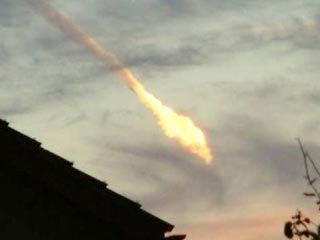Too strong! Residents of Latvia capture footage of a meteor falling to Earth (Picture)
At around 18:30 local time on October 25th, a bright fireball fell near the town of Mazsalaca in the Valmiera region of Latvia. On the 26th, senior expert at the Latvian Environment, Geology, and Meteorology Center, Uldis Nulles, stated that the fireball from the previous day was a large meteorite. However, due to intense burning as it passed through the atmosphere, the size of the part that fell was reduced to about the size of a fist. Despite this, the meteorite still created a crater on the ground with a diameter of 20 meters and a depth greater than 10 meters.
Fortunately, before the meteorite fell, eyewitnesses successfully captured footage of its passage through the atmosphere and its violent combustion. Uldis Nulles said, "I arrived at the scene the evening of the meteorite's fall. Now we can confirm that the size of the fallen object was not very large, approximately the size of a fist." He believed that what fell was indeed a meteorite, not a component detached from a satellite or airplane. Scientists will soon publish accurate information about the fallen celestial body after conducting detailed analysis.
Senior researcher at the Russian Academy of Sciences, Vladimir Svetsolv, believes that the meteorite that fell in Latvia was likely one primarily composed of iron elements - stone meteorites usually burn up entirely in the atmosphere and rarely reach the ground. He pointed out, "Judging from the images published so far, the diameter of this meteorite before entering the atmosphere might have been around 1 meter, with a mass reaching several tons."
Svetsolv explained that meteorites of similar size impact Earth roughly once a year. In most cases, they are made of stone, so they rarely leave noticeable traces on the ground. Among meteorites impacting Earth, only about 10% are iron meteorites.
According to Ansis Shteynboths, a local resident who witnessed and filmed the meteorite fall event, he first heard a loud noise from the sky before starting to record. He stated, "I first heard a sound like an airplane engine. It was as if an airplane had flown close to the ground. It fell not far from our town of Mazsalaca."
After the unknown celestial body fell, Latvia's military and radiation detection center immediately sent personnel to the incident site. Early morning reports on the 26th indicated that trace amounts of radiation were detected at the landing site.
It is worth noting that the meteorite's landing site has become a tourist attraction - people from all over Latvia are rushing there to see this rare meteorite crater in person. However, seeing the crater now comes at a cost - Larisa Gorashimova, the owner of the land where the crater is located, has begun charging admission to visitors eager to see it - each ticket costs approximately 2 dollars.
